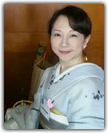Contemprary Tanka Poet Mariko Kitakubo. Article details.
Tanka Society of America, Ribbons Summer 2008
Tanka Society of America, Ribbons Summer 2008
Cicada Forest by Mariko Kitakubo, trans.by Amelia Fielden, Kadokawa Gakugei Shuppan Ltd.,Tokyo,2008.ISBN978-4-04-652019-7C0092.51/4by8,paperback,perfect bound, 189pages.
Reviewed by Dave Bacharach
For some time now,I had been thinking that I would
like to put together a bi-lingual anthology of my work.
But I held back,feeling that it was not yet appropriate
for an immature poet like myself to do so.
With these words Mariko Kitakubo opens her preface to this recent anthology of her work, consisting of new tanka and selections from I Want to Tell You in the Words of Waves(1999),When the Music Stops(2002),and On This Same Star(2006). Neither of the first two books have been published in English, which means that besides the 24 tanka selected from On The Same Star, the other 312 poems are appearing in English for the first time here. Kitakubo’s modest description of herself is belied by the poetry found in her anthology. Her range of expression, varietyof subject matter, broad structural devices, and, as Michael McClintock phrases it in his introduction, her “transcendent, personal vision of human experience,” all indicate her mature mastery of the form, She tends to write about people close to her: her son, her mother, her father, her lover; but so keen is her self-understanding, and so effectively is she able to convey her thoughts and feeling through her poems, that the reader’s level of recognition passes beyond the particular subject of any one poem and enters areas universal to the human condition. In the generous opening section, consisting of 92 previously unpublished poems, she writes of death and illness, love and the loss of love, and her father. Rain and water imagery are always important to Kitakubo, and they appear in many of the poems, as well as symbols and descriptions of decay and dissolution; sometimes both water and decay occur in the same poems, often with added poignancy created by personification:
were they yearning
for some distant water,
the crystals
scattered
when my necklace broke
a single grape
with an innocent gaze
begs my help
before it is crushed
into chardonnay
It is instructive how, in the second poem, a sense of deep pathos is created around the fate of a mere grape. A thoughtful rereading of the poem reveals that it achives its affect by the use of language in lines two, three, and four that is associated in the reader’s mind with the violent death of a child.
Kitakubo’s father, who left her and her mother when the poet was very young, figures in some of tanka of the latter part of this section. The water theme continues, and she adroitly uses it as a defining simile in a poem about her father:
like clouds
vanishing from a puddle
that morning
my father
silently disappeared
In the selections from I Want to Tell You in the Words of Waves, the author’s son and father appear prominently, and though it is natural that the two should be linked in her imagination, the recognition of that link comes as a shock to the author. She uses a simple but highly effective metaphor to describe that shock:
when he bends down
I can see in the boy
my dead father ―
the pendulum of my chest
slowly comes to a stop
Themes of birth and renewal occur throughout the section. As the title suggests, water again appears often as a recurring symbol, especially in the latter part of the section, with several poems set at the beach and referencing the sea. In a series of compelling tanka, Kitakubo emphasizes the deep, almost mystical connection between water, the birth process, and the essence of being a female. It is suggested that, ultimately ,water is the last refuge for a woman:
mind and body
the sea accepts women
with hearts
which now
have nowhere to go
sick at heart
as I face the tide
I wonder
what do I hope for,
what is my future
Many of the poems in When the Music Stops, the next to last section, express the sadness and nostalgia brought about by meditation upon temporality and death. Kitakubo’s images are always clear, hard, and striking, leaving little ambiguity as to meaning:
at night
when I try to hear the wind,
the sound of nails
being hammered into my coffin
rings in my ears
Some of these poems contain surprising images of violence, as in one startling instance where, without warning, the author makes an observation one might expect to find in a tanka written by Dostoevsky:
such brightness
wraps my morning window ―
the secret desire
to murder, and love,
are extremely similar
The last section, selected from On This Same Star, focuses on the author’s mother, whose death was the dominant theme of the book. This section is relatively brief, consisting of 24 poems, but they provide some of the bittersweet flavor of On This Same Star, and will motivate many readers to seek it out.
The above examples give some indication of Kitakubo’s variety of theme, image, and structure. A unifying element, however, runs through it ― an overrinding sense of the human condition, its joys, sadness, anger, bitterness, fear, and hope. Much of the book’s effects can be credited to Amelia Fielden’s thoughtful and knowing translation, in which the author gave her a than usual insight into the meaning and style of the poetry in its original language. This is all to the reader’s benefit: we can be grateful to the poet/translator team that has produced this volume. Perhaps in the future, if we are luchky, the same team will consider making the rest of Kitakubo’s work available to the English reading world.

 Prev
Prev